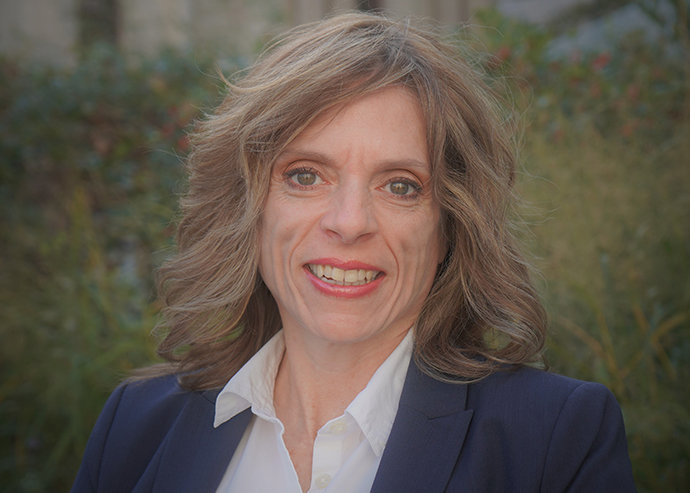
Certificate in Neuroscience, University of Pennsylvania ‘22
Master of Arts in Biology with an advanced certificate of Study in Cellular, Molecular, and Developmental Biology, Villanova University ‘08
Bachelor of Science in Biochemistry, Albright College ‘91
“Science is always evolving,” says Michelle Miller. “There are constantly discoveries. You have to stay on top of it.” With a background in immunology, Michelle has worked with pharmaceutical companies toward developing new treatments for autoimmune diseases as well as infectious diseases such as HIV and hepatitis. Now the Director of Clinical Development for the Gene Therapy Program at Penn’s Perelman School of Medicine, Michelle develops clinical strategies for gene therapy products that may someday be used to treat ultra-rare genetic diseases. “I’m doing what I love, which is designing clinical studies and interrogating a path forward for various diseases and indications—in an academic setting where there is a bit more opportunity to be innovative,” she adds.
To stay up to speed in her field, Michelle confers with medical experts and reads research journals—but as a single parent working full time, she felt that further studies were out of reach. Then she learned of the opportunity to take Penn LPS Online classes in subjects like neuroscience, so she jumped at the chance to learn more about what she calls a “black hole” in her scientific background. “The online courses gave me the opportunity to fill some gaps in my knowledge without interrupting my work or my time with my children,” she says.
Courses in the Certificate in Neuroscience typically feature lectures with slides, problem sets to help you assess and apply your knowledge from the lectures and readings, and discussion boards inviting students to apply their scientific knowledge to answer puzzling questions in the field. “I thought, ‘Oh, this will be easy,’” laughs Michelle. “It was not easy. When the description says to expect to spend 20 hours or more a week, you better believe it. Even with my science background, it’s challenging.” But although the balance of work, coursework, and family time was intensive, Michelle felt supported by her instructors. “I find the professors very knowledgeable. Not only will they answer your questions, they will expand on their response by sending you relevant recent neurologic science information if they’re aware of any,” she says.
After taking NEUR 1000: Introduction to Neuroscience, the required introduction to the certificate and course series, Michelle went on to take courses that aligned with her interests in disease treatment. “I just took one class to fill this gap in my knowledge, and I liked it so much, I thought I might as well take one more,” she recalls. “And then I looked at the list of classes offered and I thought, well, that looks interesting too.” In NEUR 2800: Autonomic Pharmacology and NEUR 4000: Psychopharmacology, there were even more scientific journal articles to read and analyze in assignments comparable to writing weekly papers. “I could get through some of these quickly because of my job—only in the sense that I read journal articles all the time, so I understand the format,” she reflects. “But these were diseases I wasn’t familiar with. It’s contemporary—you’re not learning old news. It was all new information for me.”
“Neuroscience is notoriously complicated,” she adds. “I have a better appreciation for how complicated—why it’s so hard to find answers, and how it can be so intertwined with other morbidities.”
Having now studied neurological cell signaling, the ways different drugs work in psychopharmacology, and what happens to different cells during different disease states, Michelle feels that the “black hole” in her neurology knowledge has been illuminated. “I have a better understanding of the literature that I read and the diseases I work on that have a neurologic component. When I’m in scientific meetings, I can formulate questions better. I feel like I’m better prepared, even in my own job, to have these discussions with experts in this field,” she says. “I don’t know as much as they do, but I’m not clueless.”
While Michelle has one course remaining to complete her Certificate in Neuroscience—and is considering pursuing the Advanced Certificate—she has also explored adjacent topics, including ETHC 2000: Ethics & Society. “Doing research in a human being is always controversial,” she explains. “The reality is that you’re using an investigational product. You do everything you can leading up to human dosing to discharge any harm, but until you administer the product to a human being, you cannot be certain of the outcome, either benefit or risk. So, you always have to operate with the highest level of ethics.” Michelle was interested in seeing how ethicists approach medical problems, and writing papers for this ethics course challenged Michelle to think outside of the box. “We clinical scientists tend to be black-and-white thinkers. Either the data supports this, or they don’t. To think so expansively and in a philosophical way, that was hard for me. But that’s a good thing,” she concludes. “You don’t always want to be surrounded by people who think like you. If you never hear how other people arrive at different conclusions and mull over their process, you will never learn anything.”
The same might be said of the high-level neuroscience courses, where students sometimes confronted two evidence-based, scientifically supported journal articles with opposing viewpoints. “It teaches you to think more critically and more broadly,” says Michelle. “And that there’s so much that is yet to be discovered. You’ve got to keep pressing and keep looking.”
